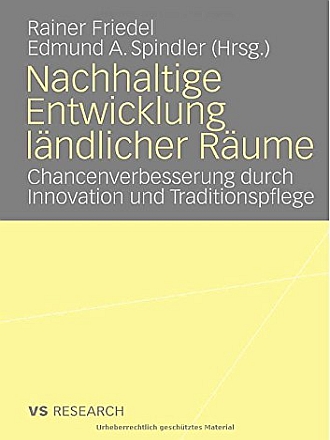Rural Areas - People - Innovative Development (RAPIDO)
- Project
- Research Program
- Duration
-
-
Despite three generations of rural development policies and with the 4th starting in 2007, rural areas still face considerable problems. Many problems of European societies such as an ageing population, high unemployment rates, social disparities and the lack of adaptive potential to the global market are more pronounced in rural areas than elsewhere. To overcome these problems, it is essential to link public, private and inter-sectoral initiatives to foster innovation. RAPIDO has been established to analyse current best practices concerning the development of innovation in agriculture, forestry, the food sector and the wider rural areas, as well as to analyse methods to transfer knowledge to different target groups.
A large percentage of Europe’s territory consists of rural areas that contain more than half of its population. The Lisbon Strategy, which aims to make Europe the most competitive, knowledge-based society in the world, is focusing on jobs and economic growth, especially in rural areas. Innovation is seen as a precondition to reach these goals. It is essential to link European programmes and resources available together and make best use of the instruments and resources to reach the goals of the Lisbon agenda. To have access to the relevant knowledge regarding existing options is crucial in this process.
RAPIDO has been established to analyse current best practices concerning the development of innovation in agriculture, forestry, the food sector and the wider rural areas, as well as to analyse methods to transfer knowledge to different target groups. Based on the analysis of success criteria and promising options for the future, policy recommendations will be given regarding which areas to focus on and concentrate efforts in the future.
The overall aim of RAPIDO is to support European policies on how to foster innovation and knowledge transfer in rural areas. To achieve this aim RAPIDO has the following specific objectives:
- To identify key areas on which to focus in agriculture, the food industry and forestry
- To exchange information on experiences and strategies in rural development and to foster mutual learning and knowledge exchange across regions in Europe.
- To identify key factors for success and also existing barriers and constraints to the creation of innovation in rural areas.
- To identify sectors where innovation would help to create employment in rural areas
- To analyse the role of different actors (public / private / industry / policy makers / community stakeholders) in the promotion and uptake of initiatives
- To review the most promising methods to facilitate innovation (processes) and knowledge transfer.
- To evaluate the role of ETAP (Environmental Technology Action Plan) in fostering innovation in rural areas.
- To give recommendations on how to facilitate innovation through A: rural policies (question of policy design, efficiency of policies), B: public/private and sectoral initiatives to foster innovative development, C: funding mechanisms and D: bottom up initiatives (local / regional bottom up initiatives)



